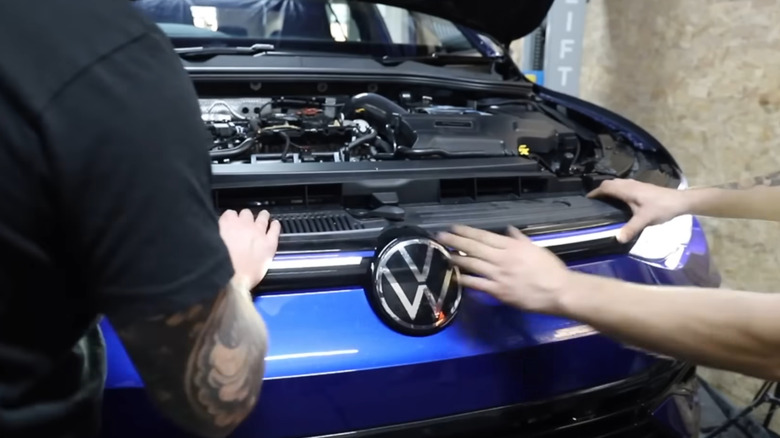Common Problems You Might Have If You Drive A Volkswagen (And How To Avoid Them)
Volkswagen gets a lot of love and hate in equal measure. It's often glorified for its "German engineering," which barely scratches the surface, as it is known for reliability, comfort, and good road manners. It also boasts being the second-largest automobile manufacturer in the world, by production. But as they say, with great power comes great responsibility. Volkswagen might be "on top of the hill" when it comes to global vehicle production and sales, but Consumer Reports ranked it 26th among other car brands in America in 2025. It ranked 13th best in maintenance and reliability, 25th in owner satisfaction, and 16th and 18th consecutively in used and new car reliability.
Reliability and German engineering goodwill aside, Volkswagens are known to experience some common issues, including electrical gremlins, transmission faults, and engine failures. Still, these problems don't cut across all Volkswagen models. For instance, the naturally aspirated 2-liter and 2.5-liter engines are among the most reliable engines from Volkswagen. However, in some models, they still suffer from electrical issues. Meanwhile, there are common problems with the 1.8T and 2.0T turbocharged engines, such as the PCV (Positive Crankcase Ventilation) system, water pump, coil packs, and fuel injectors, according to previous owners.
2008, 2013, 2022, and 2023 Volkswagen Tiguans' timing chain and engine trouble
The automotive industry is shifting towards crossovers and SUVs, and since its debut in 2007, the Volkswagen Tiguan has consistently maintained strong popularity. It's the brand's best-selling model in the United States, with over 94,000 units sold in 2024. The 2025 Tiguan is quite impressive, featuring a premium exterior design, efficient power delivery (on the base FWD trim), excellent suspension, and smart-value features.
VW Tiguan models manufactured between 2008 and 2013 are known to experience premature timing chain failure and high oil consumption — issues that, if left unaddressed, can lead to catastrophic engine failure. A major culprit is the timing chain tensioner on the 2.0-liter TSI engine that is prone to failure. When it fails, the timing chain can slip on the pulleys, affecting the timing of the engine valves. Timing chain warning signs include engine misfires, loss of power, and rough idling. High oil consumption affecting the 2022 and 2023 models is primarily due to defective piston rings, forcing owners to top up oil between routine services.
If you own any of the affected model years, keep an ear out for rattling or ticking noise during start-up — it could be an early sign of timing issues. If you are already experiencing misfires or a rough idle, it is advisable to have your mechanic inspect the timing chain tensioner and consider replacement. Most importantly, Volkswagen offers a 60,000-mile/five-year powertrain warranty on the Tiguan, which may cover this issue.
2011-2013 Volkswagen Jetta transmission and electrical issues
There are a ton of positive reviews about the Volkswagen Jetta on forums from previous owners. This popular Volkswagen sedan has earned a great reputation among sedan lovers for its excellent fuel economy, smooth ride, spacious interior, and responsive handling. On the flip side, the Volkswagen Jetta can be problematic due to transmission failures in its DSG (Direct Shift Gearbox) gearbox on early 2010s models (2011-2013). Owners reported shifting issues, fluid leaks, and mechatronic failure that led to jerky gear changes and hard shifts, and in some instances, loss of drive.
The early 2010s Volkswagen Jetta also experienced electrical issues, affecting the power windows and central locking system. Most notably, owners have reported the dreaded "Christmas tree effect," a coded term among car enthusiasts to describe multiple dashboard warning lights on Volkswagens. To stay ahead of these issues, Jetta owners are recommended to stick to regular transmission fluid changes, scan warning lights immediately they appear, consult a VW specialist for electrical issues, and regularly check for recalls or technical service bulletins from the manufacturer.
2003, and 2015-2020 Volkswagen Passat coil pack and fuel system issues
Before its discontinuation in 2023, the Volkswagen Passat was a relatively popular contender in the mid-sized sedan segment in the United States. Like the Jetta, the Passat offered refined handling, comfort, and practicality, but not without a few reliability quirks. VW Passat models, specifically those featuring the 1.8T turbocharged engines, are known to experience issues with the coil packs, which can cause the car to experience a hard start or loss of power. Volkswagen has a history of failures with its coil-on-plug ignition system on specific models, including the GTI, Golf, Jetta, and Passat, which prompted the company to issue a Customer Satisfaction Campaign (CSC) in 2003.
Passat models from 2015 to 2020 also have issues with the fuel system, specifically with the injectors and fuel pump, which also prompted the automaker to announce a recall. Fuel system issues on the Passat often manifest as engine sputtering, misfires, difficulty starting, a flashing Malfunction Indicator Light (MIL), and even stalling. If you own a Volkswagen Passat from the affected years, use only high-quality fuel and filters. Also, replace the coil packs at the first sign of misfires. A rule of thumb is to run regular diagnostic tests to find minor issues early.
2011-2020 Volkswagen Golf/GTI cooling, turbo, and sensor problems
The Volkswagen Golf and GTI models are a no-brainer if you're looking to own a car with a sporty edge from the German manufacturer. They have character, good road manners, and only cost a fraction of the price of A-line performance cars. However, the MK7 models (2015-2018) are prone to turbo issues due to wastegate pivot shaft seizures and oil starvation. These issues with the turbo can lead to boost cuts, exhaust smoke, and bad gas mileage. The Golf and GTI models, which stands for Gran Turismo Iniezione, are also known to experience cooling system leaks (2011-2014) and faulty sensor issues on newer models.
It's hard not to push the Golf GTI to its limits — after all, it was built for spirited driving. However, due to its turbo issues, it is essential to let it cool down after hard driving before switching off the engine. Installing a quality aftermarket turbo timer can help manage this. During regular maintenance service, be sure to check all sensors and replace any that are worn out. As with any car, whether a standard Golf or a GTI, regularly checking coolant levels is essential for engine longevity.
Preventive maintenance tips for Volkswagen owners
Here's the truth. Volkswagen's reliability comes and goes in waves, and more often than not, it depends on the model and year of manufacture. The German manufacturer's problems didn't just start with the Dieselgate scandal – in America, they date back to the 1990s, marked by dismal sales, a tarnished reputation, and reliability issues. Fortunately, the VW Jetta and the MK3 Golf made significant contributions to turning things around.
Vehicle reliability is a two-way street, and the owner plays a huge role. If you are looking to buy a used Volkswagen, start by running a VIN check to identify any open recalls. When buying a used Volkswagen, conduct a thorough background check on the vehicle's VIN to verify if there are any open recalls. If possible, consult a certified VW specialist.
For current VW owners, following the recommended maintenance schedule is essential; however, going the extra mile can make a significant difference in improving reliability. This might mean investing in a personal diagnostic tool or changing the oil more frequently. According to a Volkswagen owner on Reddit, shortening oil change intervals to every 5,000 miles instead of the manufacturer-recommended 10,000 miles can help boost engine longevity. If you're just getting into VWs, joining a local club or online community can be a great way to learn from others and identify potential issues early.





